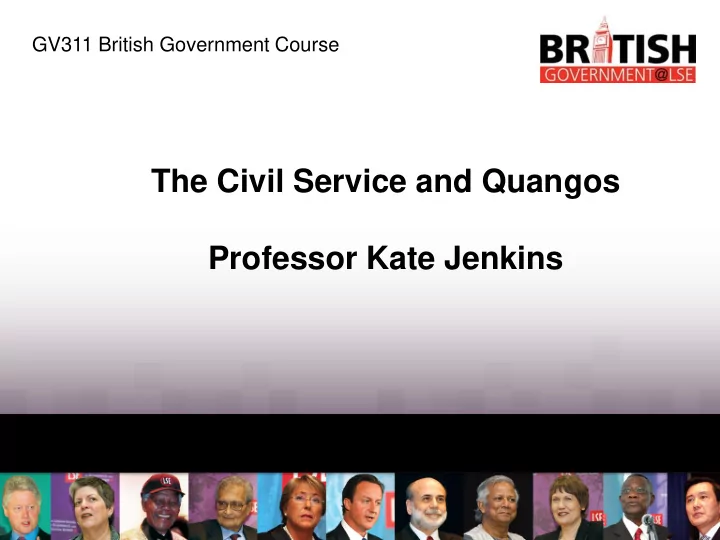

GV311 British Government Course The Civil Service and Quangos Professor Kate Jenkins
What the Civil Service Looks Like Politicians (Cabinet and Ministers) Cabinet 22-24 Junior Ministers 95 Special Advisors 100 (approx.) Officials Permanent Secretaries (Head of Depts and Ministries) 40 Senior Civil Servants (Policy and Management) 50,000 Executive and Administrative 470,000 Organisations Civil Service : Departments and Ministries Executive Agencies Public Service : Public Corporations Non-Departmental Bodies
What Does it Spend? Four Major Spending Areas : £478 Billion Pensions Health Welfare Education Other Spending Areas : £239 Billion e.g. Transport Law and Order Agriculture Business Defence Total Spending : £717 Billion
The Rest of the Public Sector Quangos, NDPBs, Statutory Bodies, Public Corporations A range of names and activities Normally set up by statute To do things for Government that Government does not want to do directly because it: - is too specialised - is too contentious - wants to give an independent view
What Are They? Public Corporations BBC (licence fee a form of hypothecated tax) Statutory Body The Arts Council (government controlled budget handles the public debate) Independent OFSTED (Office for Standards in Education) Regulator Service Provider NHS • constant change of structure • creaking structure • constant criticism • ministers refuse to separate from government
Things Change: The Case of the Post Office 1665 First postal service 1780s Third largest government department 1810-1970 The Post Master General in the Cabinet; GPO responsible for postal service; post offices and development of telephones 1970 Post Office made a public corporation 1985 Telecoms Division privatised Post Office reorganised into three separate businesses, staff of 300,000 2013 Largest business: Royal Mail 60% privatised Post Offices remain public corporation
How the Civil Service Developed: Evolution by Reports 18 th Century Small government, growing official responsibility Separation of ‘ministerial’ and ‘official’ functions 19 th Century Growing concern about competence of civil servants, contrast with Indian civil service 1854 Report by Trevelyan and Northcote: ‘the civil service is for the unambitious, the indolent and incapable Recommended appointments on merit and competitive examinations Unpopular, took decades to implement 1919 Post war reorganisation, generalists to work with Ministers, separate classes for different levels, pay arrangements, pensions – still in place in 1970s
Samuel Pepys George Downing
The 1960s and the Fulton Report Found : Lack of training, poor management, not up to date Recommended : Re-grading, training, more management skills, wider experience, more flexible systems Need for : ‘keeping in touch with the modern world’ Long Time to concentration on over 60 detailed Implement : recommendations, no overall view of what was needed
The 1980s and Next Steps Improving Management in Government: The Next Steps Informal, short report by the PM’s Efficiency Unit Found : Lack of accountable management, lack of precision about results, need to focus on outputs, handicap of uniform system Recommended : reorganisation into executive agencies with clear tasks and budgets ‘The civil service must own the changes as they evolve, it must not feel that ill considered change is being thrust upon it’ Implementation arrangements in the report implemented within 5 years 75% of civil service in agencies
Last 20 Years: Constant Change Changes to Services : • Search for different structures: cutting costs • Contracting out: reduced costs, better services but contractual problems • Continued search for privatisations • Lack of experience with private sector contracting • Impact of technology on systems and staffing Changes to civil service employment : • Introduction of more flexible and short-term contracts • Growth of numbers of special advisers • Implications for principles of civil service employment • More senior officials from outside the Civil Service
The Constitutional Position: What is a Civil Servant? Civil servants permanent, do not change with governments are: politically impartial, no loyalty to any political party are not corrupt Their role is: to maintain the Queen’s Government to act as servants of the Crown to work for the Government of the day to protect the probity of Government Clash comes when use of power can be too tempting: classic case of Pergau Dam Critical role of the Cabinet Secretary to deal with situations when question of propriety arise
Robert Armstrong
How Does All This Work in Practice? Three examples from experience : 1. What generalists can miss : • the case of mass redundancies and contract law 2 . How parliament can work round inconvenient rules • the case of maternity pay 3. How a government can make a major change to the public sector without legislation • the case of executive agencies
Civil Service Legislation • Arguments about legislation to protect the civil service from political pressure for decades • Many attempts at draft bills • 2010 Constitutional Reform and Governance Act put Civil Service values on a statutory footing: o integrity o honesty o objectivity o impartiality • Still concerns: o agency accountability o separation between policy makers and management o the role of special advisers o the quality of decision making
Is There a New World? • New technology can transform much of transactional work • Cost should fall rapidly • Data can improve decision taking Does the principle of permanence reduce flexibility? Is impartiality still possible? Do we fuss too much about probity? Should there be another rethink of the Civil Service?
Recommend
More recommend